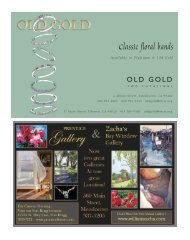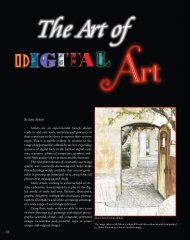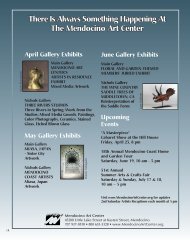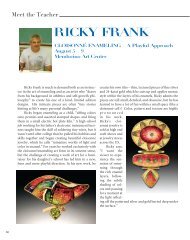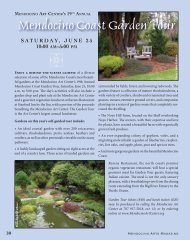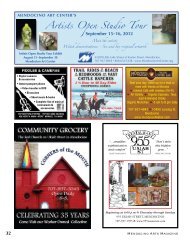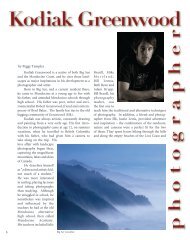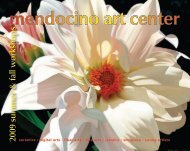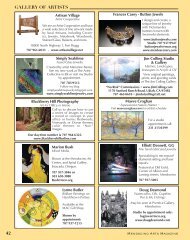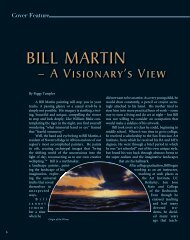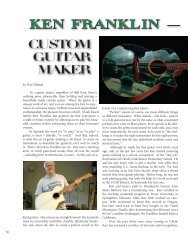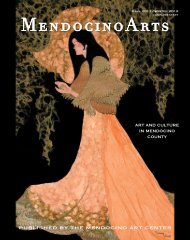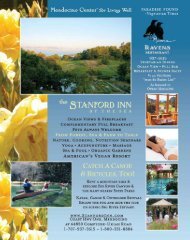Create successful ePaper yourself
Turn your PDF publications into a flip-book with our unique Google optimized e-Paper software.
quite grasp, and one day I was in a meadow by myself…beautiful…Diane was at the house—and there was a plane in the sky, and I feltmy body stiffen. I was in the hunt for whatever was going on insideme,and I was trying to figure out my feelings and motivations.I suddenlywas scared at the sound of the plane, and I saw it was just aninnocent plane in the sky, and I said, 'Wow, what was that?' and Irealized that it came from the war, and the little boy in me, who's stillthere, had learned that that sound was a dangerous and fearfulsound,and that that little boy,for very good reason,had that fear,butnow the grown man didn't need it and I could let it go,and I—physically,it seemed—let it go, and it just went, and when it went I startedto cry my eyes out. I was just sobbing. It was as though the fearhad been trapped by all this emotion and out it came,and right afterthat—this was a very big moment for me—all this music suddenlywas happening. It was already there, it seemed like, and it was justcoming through me or into me. I went back to the house and sangthe music as well as I could. It was huge. It was all tones that hadsome incredible meaning to me, really connected to the emotionthat I had felt, that I had let go of."Anyway, from that moment I began to listen for my emotionin musical tones. I began to practice allowing the sound to emerge.It just was there. It emerged spontaneously. Later I played with itmore; I developed it more, but in those first few years, I had no wayof keeping the melody, whatever it was the piece would just go, butcertain pieces would return according to the emotion that I was feeling.There are three or four of those early pieces in Blue Dove. Oneof those pieces in the show—you remember—at the train station: loda de da da da da-a-a, lo da de-e da da-a da da…"Peter has a nice voice and riffs these lines in a jazz-singer style."Very melodic," I say."Very emphatic," he responds."There's a wholemusical thought there. I put lyrics on it later because I'd got thiswhole inventory of melodies that I coulduse for the show."He sings another couple of lines thatI remember."That came very early, and the musicwould come back to me. Then I'd lose it. Iwouldn't know where it was. I couldn'tfind it anywhere. Eventually I bought apiano and worked some of the melodiesout. I had a tape recorder, and then after Igot the piano I got a synthesizer that had amemory."What led to this was the war and thefear that was there. We carry around withus everything that's ever happened to us. Iwas eight when the war ended, just aboutto be nine. My friends and I would go andexplore all the bombed-out houses nearwhere we lived. There were many beautiful old homes, Victorianhomes, and they had been hit with incendiary bombs or whatever,and we would go in. I remember looking at old books and clothesand things.I did bring a book home,I think.I don't remember whatit was. Another effect of the war, which continues, is my total identificationwith the children who are being bombed—in any situation.I don't care who they are, whether it's in Belgrade or Baghdador anywhere."Diane has popped in a couple of times during this interviewand now leaves, "He does, he identifies with any kids who are beingbombed," trailing after her as she goes.I ask if there were any good memories from the war. He says itwas good to see his father alive, and it was good to see his uncle alive,but then his uncle was killed in combat, in the last year of the war."He was my mother's only brother, and we were very close. That washeavy. There was such a pall over everything. Everybody was at riskevery moment. I couldn't say that family gatherings were… It wasn'tuntil after the war that they got more celebratory.The real essenceof everything was that anybody could die at any moment, so therewas a certain bravado in that."He tells me of going, in his early teens, to an English publicschool (always a confusing designation for Americans because it'swhat we call a private school). It was founded by Shakespeare's colleagueand leading actor, Edward Alleyn. They did Julius Caesar inmodern dress—the school cadet uniforms—on the playing field,which were bold innovations when Peter was there. He tells me ofdisconcerting disclosures about his parentage, after which he couldnot accept anyone's authority over him. He tells me of the lovely girlwho was his first girlfriend, Joyce Fielding—"I was in awe of her"—and then of coming to Canada,a man of twenty without a plan,thenthe States, lured by the Siren call of San Francisco. But the War hasentered the room, what Americans arepleased to call the "Good War," and to Peterwas the Good-Riddance war. I ask him ifthere was general jubilation at the end."Ah! VE Day was—I had a little twowheeledbike, and I took off to watch all theparades in London—my mother didn'tknow where I was. I was eight, and it wasabout three or four miles up to Whitehalland the houses of Parliament, and it was justthe happiest day of my life. I never expectedit, didn't expect to survive, didn't expect myfather to survive."Something, the force of the memory,brings Peter to the present tense."The threat of death is continuous. Itdoesn't stop. You've got the experience of itall around you,so you naturally anticipate it."51



